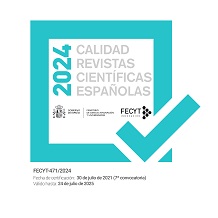Effect of an Educational Intervention for Family Caregivers of Individuals with Cancer in Surgery
Abstract
Objective. To evaluate the effect of an educational intervention on family caregivers of adults with cancer who are in the postoperative period of oncological surgery, to strengthen the competence of home care and reduce overload.
Method. This was a quasi-experimental quantitative approach with intervention group and control group; 290 family caregivers of patients undergoing surgery were included, educational intervention was applied from admission to six weeks after discharge, measurement was made before and after competence for home care and care overload.
Results. In the group intervened, a positive and statistically significant impact was obtained in the competence for home care and decreased overload.
Conclusions. The educational intervention is a strategy that increases skills for care at home, and reduces the burden on caregivers of people with cancer undergoing surgery.
Downloads
-
Abstract2221
-
PDF (Español (España))1819
-
PDF1819
References
World Health Organization. Cáncer. 2018. Disponible en: http://www.who.int/cancer/en/
Stenberg U, Vagan A, Flink M, et al. Health economic evaluations of patient education interventions a scoping review of the literature. Patient Education and Counseling; 2018; 101(6): 1006-1035.
Suh S, Lee M. Effects of Nurse-Led Telephone-based supportive interventions for patients with cancer: a meta-analysis. Oncology nursing foru. 2017; 44(4): 168-184.
Waller A, Forshaw K, Bryant J, et al. Preparatory education for cancer patients undergoing surgery: A systematic review of volume and quality of research output over time. Patient Education and Counseling. 2015: 98, 1540-1549.
Teixeira R, Remondes S, Graca M, et al. The impact of informal cancer caregiving: A literatura review on psychophysiological studies. Eur J Cancer Care. 2019; 28(4): 1342.
Frambes D, Sikorskii A, Tesnjak I, et al. Caregiver-reported health outcomes: effects of providing reflexology for symptom management to women with advanced breast cancer. Oncol Nurs Forum. 2017; 44(5): 596-605.
Melo B, Vargas Y, Carrillo G, et al. Efecto del programa plan de egreso en la diada persona con enfermedad crónica y sus cuidadores familiares. Enfermería Clínica. 2018; 28(1): 36-43.
Smith-Turchyn J, Morgan A, Richarson J. The effectiveness of group-based self-management programmes to improve physical and psychological outcomes in patients with cancer: a systematic review and meta-analysis of randomized controlled trials. Clinical Oncology. 2016; 28 (5): 292-305.
Leow M, Chan S, Chan M. A pilot randomized, controlled trial of the effectiveness of a psychoeducational intervention on family caregivers of patients with advanced cancer. Oncol Nurs Forum. 2015; 42(2):63-72.
Carrillo G, Barrera L, Sánchez B, et al. Efecto del programa de habilidad de cuidado para cuidadores familiares de niños con cáncer. rev.colomb.cancerol. 2014; 18(1): 18-26.
Carrillo G, Sánchez B, Vargas E. Desarrollo y pruebas psicométricas del instrumento “CUIDAR”-versión corta para medir la competencia de cuidado en el hogar. Salud UIS. 2016; 48(2): 222-231
Barrera R, Campos M, Carrillo G, et al. Entrevista de percepción de carga del cuidado de Zarit: pruebas psicométricas para Colombia. Aquichán. 2015; 15(3):368-380.
Organización Mundial de la Salud. Pautas Éticas Internacionales para la Investigación Biomédica en Seres Humanos (CIOMS). 2017. Disponible en: https://cioms.ch/wp-content/uploads/2017/12/CIOMS-EthicalGuideline_SP_INTERIOR-FINAL.pdf
Instituto Nacional de Cancerología. Análisis de situación del cáncer en Colombia. Bogotá: Instituto Nacional de Cancerología ESE. 2015. Disponible en: https://www.cancer.gov.co/Situacion_del_Cancer_en_Colombia_2015.pdf
Chambers S, Girgis A, Occhipinti S, et al. A Randomized Trial Comparing Two Low-Intensity Psychological Interventions for Distressed Patients With Cancer and Their Caregivers. Oncology Nur Forum. 2014; 41(4): 256-66
Osorio R, Coral R, Campos M, et al. Cuidadores y cuidadoras familiares de personas con enfermedad crónica en Colombia: más similitudes que diferencias. Salud Uninorte. 2015; 31(2):255-265.
Young, J, Butow P, Walsh J, et al. Multicenter randomized trial of centralized nurse-led telephone-based care coordination to improve outcomes after surgical resection for colorectal cancer. Journal of Clinical Oncology. 2013; 31 (28): 3585–3591.
Beaver K., Williamson S, Sutton C, et al. Comparing hospital and telephone follow-up for patients treated for Stage-I endometrial cancer (ENDCAT trial): A randomised, multicentre, non-inferiority trial. BJOG. 2017; 124: 150–160.
Petricone D, Lebel S. Being a caregiver to patients with ovarian cancer: A scoping review of literature. Gynecologic Oncology. 2016; 143: 184-192
Sun V, Raz D, Ruel N, et al. A Multimedia Self-management intervention to prepare cancer patients and family caregivers for lung surgery and postoperative recovery. Clinical Lung Cancer. 2017; 18(3): 151-159.
Sánchez L, Carrillo G. Competencia para el cuidado en el hogar persona con cáncer en quimioterapia cuidador familiar. Psicooncología. 2017; 14(1).
Mosher C, Winger J, Hanna N, et al. randomized pilot trial of a telephone symptom management intervention for symptomatic lung cancer patients and their family caregiver. Pain Symptom Management. 2016; 52(4):469-482.
The works published in this magazine are subject to the following terms:
1. The Publications Service of the University of Murcia (the publisher) preserves the copyright of the published works, and encourages and allows the reuse of the works under the license for use stated in point 2.
© Servicio de Publicaciones, Universidad de Murcia, 2011 (© Publications Service, University of Murcia, 2011)
2. The works are published in the electronic edition of the journal under Creative Commons Reconocimiento-NoComercial-SinObraDerivada 3.0 España(texto legal) “ a Attribution-NonCommercial-NoDerivatives 3.0 Spain license (legal text)”. They can be copied, used, broadcasted, transmitted and publicly displayed, provided that: i) the authorship and original source of their publication (journal, publisher and URL) are cited; (ii) are not used for commercial purposes; iii) the existence and specifications of this license is mentioned.
3. Conditions of self-archiving. Authors are allowed and encouraged to electronically disseminate the pre-print (pre-reviewed ) and / or post-print (reviewed and accepted for publication) versions of their works prior to publication, as it ensures a wider circulation and dissemination which may lead to a possible increase in its mention and a higher scope among the academic community. RoMEO color: green.












